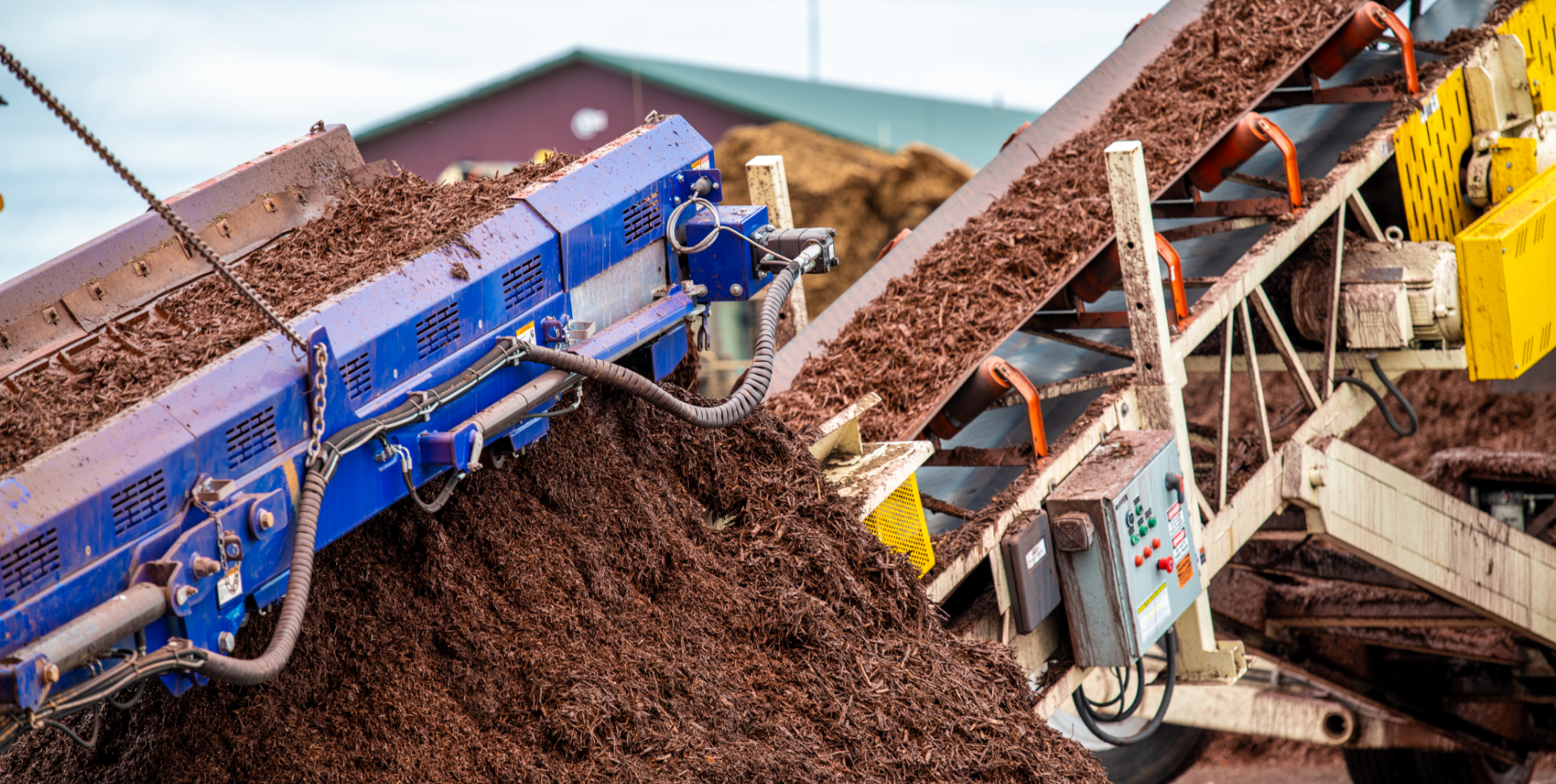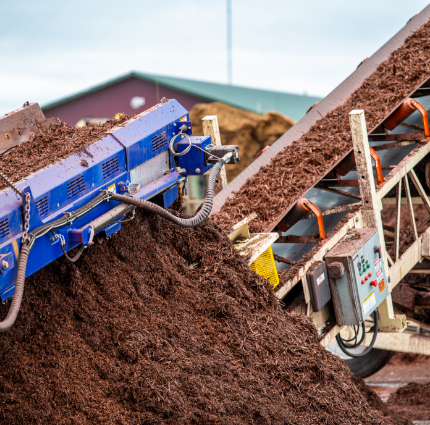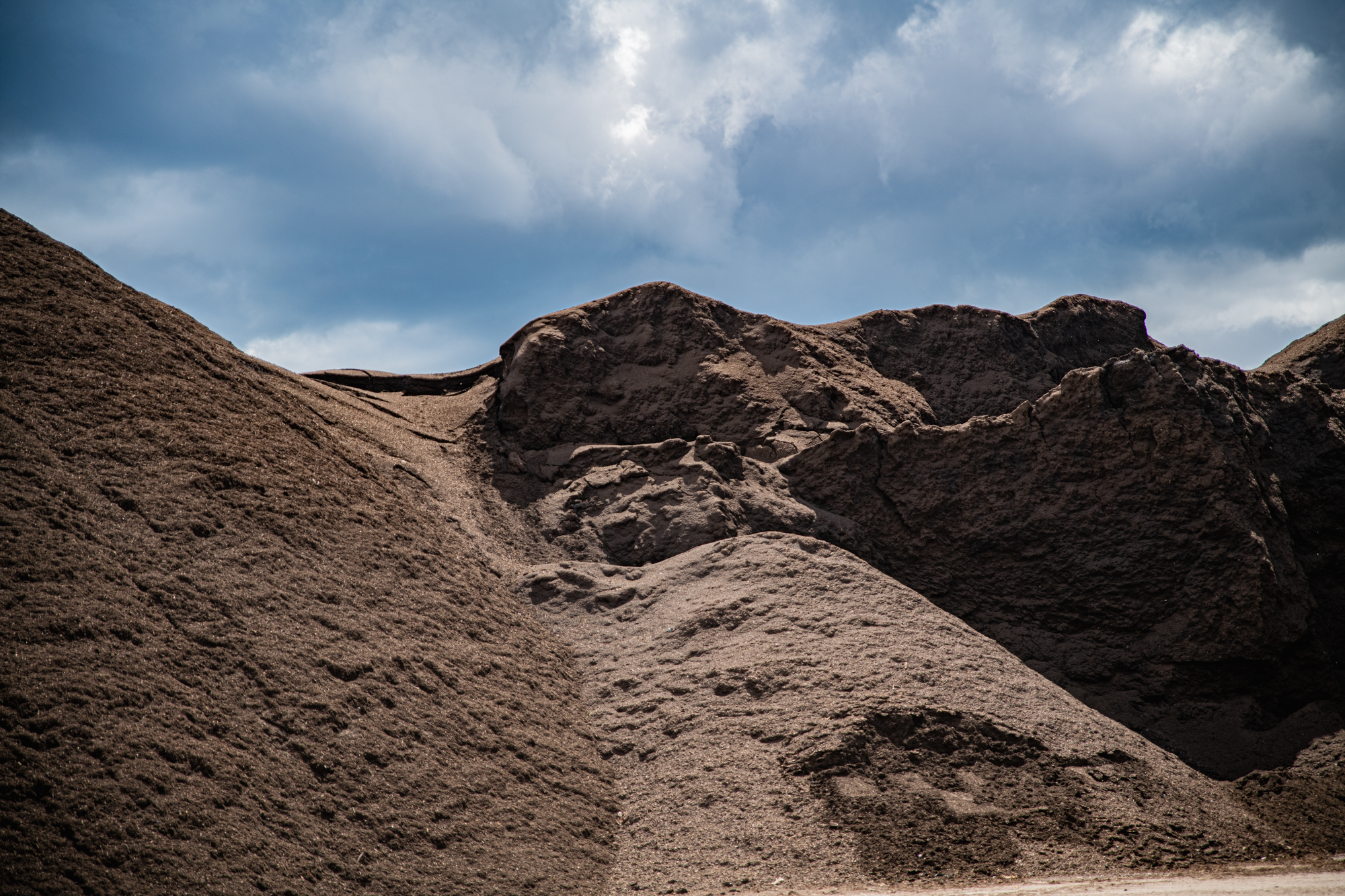


For general information, check out our hours, program details, or our process.
Compost is the product manufactured through the controlled aerobic, biological decomposition of biodegradable materials. The product has undergone mesophilic and thermophilic temperatures, which significantly reduces the viability of pathogens and weed seeds (in accordance with EPA 40 CFR 503 standards) and stabilizes the carbon such that it is beneficial to plant growth. Compost is typically used as a soil amendment but may also contribute plant nutrients. (AAPFCO definition, official 2018) Finished compost is typically screened to reduce its particle size, to improve soil incorporation. –USCC [link to external web page for more information]
Finished compost is the end result of the composting process. Finished compost can be applied to dirt as a soil amendment to improve its health, increase its water holding ability, and add organic matter to depleted soils.
Yes! While higher temperatures are created and necessary during all phases of composting, even the finished product can feel warm, often 20 or 30 degrees above the outside temperature. You may see it steam as you dig in and moisture and heat are released, but this is normal because that compost is still alive and all those microbes that are going to help your soil are still at work. Plus, the darker color of compost warms in the sun.
Compost should not be thought of as a fertilizer, even though the nutrients in compost can be immediately beneficial for your plants. Rather, compost is a soil amendment, with properties that increase the organic matter in soil, increase microbial ecology, increase biodiversity, improve water conservation, improve nutrient uptake, and balance soil chemistry.
Unfortunately, much of what is sold as “compost” is actually just degraded or rotted organic matter. At Dakota Prairie Composting, we know compost is the result of an intentional and managed process under controlled conditions where materials, oxygen, moisture, temperature and time are all balanced. This is opposed to what many call compost which is the result of large piles of wood waste piled and left to rot over a long time. The result of which can be seeds, disease, invasive species, and other qualities that can cause more harm than good.
Our compost is jumping worm free. Material that is composted at a permitted industrial composting facility, such as ours, is required by federal regulation to meet the Process to Further Reduce Pathogens (PFRP). This requires us to do regular temperature monitoring in our compost piles to ensure they are meeting a minimum temperature of 131 degrees F for at least 15 consecutive days.
These temperatures can kill any pathogens, weed seeds, and invasive species that may have initially gone into the compost process. Jumping worms and their cocoons die off at temperatures of 104 degrees F, so there is no chance for them to survive this process.
Our finished compost is kept on paved asphalt surface far away from any incoming materials, so there is very little chance any jumping worms would be crawling into the finished piles of product from the surrounding area.
When news articles and agencies talk about jumping worms spreading through compost, they are typically referring to compost from non-permitted compost sites that does not meet the stringent time and temperature requirements that permitted facilities adhere to. Their statements have caused a lot of confusion for the general public.
People should not be worried about using compost from a permitted facility. However, it should be noted that if jumping worms are already present in their yard, compost will not eliminate them.
At this time, we do not accept these materials. Woven fabric doesn’t break down quickly enough to work in our processes and differentiating between synthetic blends and natural cotton or wools along with water-repellent coatings can contaminate finished compost.
No, current commercial composting regulations prohibit the inclusion of pet waste.
Bulk grease and oil are not accepted in any containment system, but trace amounts such as oil in a frying pan wiped with a paper towel or bacon grease is acceptable. If a compostable bag will not hold it by itself, put it in the trash.
Only paper towels using a natural disinfectant like vinegar or alcohol for food cleanup should be included in the organics. If chemical cleaners are on the paper towel, it should go in the trash. Any paper towels that have been used to clean up pet waste, motor oil, or anything not related to food should also be tossed in the trash.
No, Dakota Prairie Composting will only accept food-soiled paper products. Facial tissues may contain various soothing lotions, perfumes, disinfectants, or any other additives and should be placed in the trash.
No, wet wipes often contain fragrances and chemicals for disinfecting. In addition, wet wipes are often made up of woven fibers that make them much more difficult to break down in the composting process.
No, Dakota Prairie Composting only accepts food-soiled paper products. tissue papers can contain glitter, glues, dyes, foil, or a shiny coating and should be thrown in the trash. Due to the lack of properly identifying whether each type of tissue paper is safe to compost and also since it is not a food-related item, we prefer that you keep it out of the compost bin. Encourage your lawmakers to properly label materials that meet BPI compostable standards so that composters can be certain that products are safe for the environment and their compost piles!
Our de-packaging services are only available to commercial customers. Any food disposed of as organics at our residential drop-off needs to be removed from packaging.
No, these containers have a plastic coating or lining that is not compostable. This means there will be plastic fragments left in the finished compost. The paper inside these coated items will break down leaving the coating behind.
Molded fiber food serviceware needs to be BPI-certified compostable in order to compost. Most molded paper items currently use a PFAS chemical for grease/oil/moisture resistance. The addition of PFAS chemicals in food packaging or serviceware results in costly expenses at composting facilities to manage water coming into contact with active composting piles. The food-service industry is just starting to manufacture molded paper items without added PFAS chemicals in it.
Animal carcasses are not currently allowed at Dakota Prairie Composting.
When you’re done with your carved pumpkins and other gourds, you can put them in the organics recycling cart. Remember to remove any candles or lights first! Added synthetic materials such as paint, glitter, permanent marker, stickers, or jewels make pumpkins non-compostable. Either the whole pumpkin should go in the trash, or the decorative portions should be cut off (the removed parts should go in the trash) prior to composting.
If it’s a small amount of fruits and vegetables raked up in the yard and garden, it’s ok to include in the yard waste collection or yard waste drop-off. If it’s a large amount, the best option is to separate them from yard waste as best you can and dispose of with food scraps/organics.
Trees, wreaths, and fir toppers are accepted during our Christmas Tree Drop-Off event each year. Make sure trees and wreaths are free of any wires, lights, ribbon, tinsel, flocking, ornaments, and other decorations before disposal.




